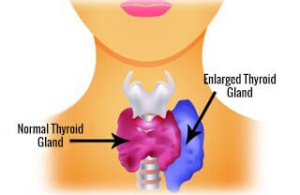Hyperthyroidism in Women: Symptoms and Recommended Foods


Written and verified by psychologist Valeria Sabater
Hyperthyroidism is a very common disease that affects the metabolic system and is characterized by an abnormal production of thyroid hormones. This can lead to a series of consequences that can be serious according to the alteration of our endocrine gland.
For women, the impact is greater due to the constant hormonal changes throughout their lifetime, an aspect that we should definitely keep in mind.
Discover: Home Remedy to Promote Thyroid Health with Honey and Nuts
Therefore, we would like to give you a little bit of information about this disease so that you’re aware of the symptoms and so that, if you already suffer from it, you know some simple diet tips that may help you out.
Hyperthyroidism symptoms in women
- Neck swelling is probably the most obvious symptom.
- Increase in appetite.
- Hair loss.
- Small mood swings.
- Menstrual cycle changes: your periods are late or last longer.
- Weak muscles.
- Sleeping problems.
- Diarrhea.
- Trouble breathing.
- Feeling more restless or hyper.
- An exaggerated sensitivity to heat.
- Possible infertility.
- Hand shakiness.
- Constant urge to urinate.
- Sweating more than usual.
- Tachycardia.
We should mention that it isn’t necessary to experience all of these symptoms to be diagnosed with hyperthyroidism. Each person is different and we all know our own body enough to know when something abnormal is happening. Just be aware.
Treating hyperthyroidism in women
Your doctor will be the person who diagnoses you after respective analyses. The most common exam is a simple blood test to analyze our TSH: thyroid stimulating hormone, which will tell you if you are in the first phase or if it is more advanced.
Medicine is very advanced and, aside from taking the proper drugs, there is the possibility of surgical intervention to solve your thyroid gland problem.
Ideal hyperthyroidism diet
According to various clinical and nutritional studies, there are various foods and plants that are very good for treating hyperthyroidism. The following is a list of them:
Vegetables from the cruciferous family
This food has a lot of chlorogenic and caffeic acid that make the absorption of iodine more difficult. Absorption of iodine is the triggering factor for hyperthyroidism disease. Where can you find these acids? In cabbage, radish, Brussels sprouts, cauliflowers, and broccoli, among others.
Thus, you should try to make plenty of salads with these vegetables and, most importantly, don’t forget to include radish, since many studies show that it regulates excessive production of the hormones that produce hyperthyroidism.
Legumes
According to nutritionists, in the case of hyperthyroidism, it’s essential to consume the following foods: lentils, garbanzo beans, and beans.
Recommended seeds and dried fruits
It’s beneficial to introduce peanuts, millet, flax, and pine nuts into your diet because they inhibit the production of thyroxine.
Fruit and raw foods
According to traditional Chinese medicine, raw foods are more refreshing and possess more nutrients. Thus, we recommend including raw peppers, carrot, spinach, beets, and cabbage in your diet.
Recommended plants for hyperthyroidism in women
Gypsywort (Lycopus europaeus) is ideal for inhibiting iodine’s action on the thyroid. You can consume it in infusions, but it’s also sold in herbalist stores in liquid form. 30 drops a day is the recommended amount.
Read more here: 5 Thyroid Treatments You Can Do at Home
Lemon balm: It’s much more effective combined with mint. You can have 3 cups a day.
Prohibited foods for hyperthyroidism in women
- Seaweed and shellfish, since they have a lot of iodine.
- Iodized salt.
- Garlic, oats, cashews, almonds, pistachios.
- Cinnamon, coffee, and all hot spices.
All cited sources were thoroughly reviewed by our team to ensure their quality, reliability, currency, and validity. The bibliography of this article was considered reliable and of academic or scientific accuracy.
- Donangelo, I., & Braunstein, G. D. (2011). Update on subclinical hyperthyroidism. American Family Physician.
- Inoue, M., Arata, N., Koren, G., & Ito, S. (2009). Hyperthyroidism during pregnancy. Canadian Family Physician. https://doi.org/10.1016/0002-9378(74)90027-1
- Reid, J. R., & Wheeler, S. F. (2005). Hyperthyroidism: Diagnosis and treatment. American Family Physician. https://doi.org/10.2165/00003495-197611020-00004
- Office on Women’s Health. Enfermedad de la tiroides. https://espanol.womenshealth.gov/a-z-topics/thyroid-disease
American Thyroid Association. Tratamiento Con Hormona Tiroidea. https://www.thyroid.org/tratamiento-hormona-tiroidea/ - American Thyroid Association. Hipertiroidismo. https://www.thyroid.org/wp-content/uploads/patients/brochures/espanol/hipertiroidismo.pdf
- National Institute of Diabetes and Digestive and Kidney Diseases. Hyperthyroidism (Overactive Thyroid). https://www.niddk.nih.gov/health-information/endocrine-diseases/hyperthyroidism#avoidEating
- Yarnell, Eric & Abascal, Kathy. (2006). Botanical Medicine for Thyroid Regulation. Alternative and Complementary Therapies. 12. 107-112. 10.1089/act.2006.12.107.
This text is provided for informational purposes only and does not replace consultation with a professional. If in doubt, consult your specialist.








